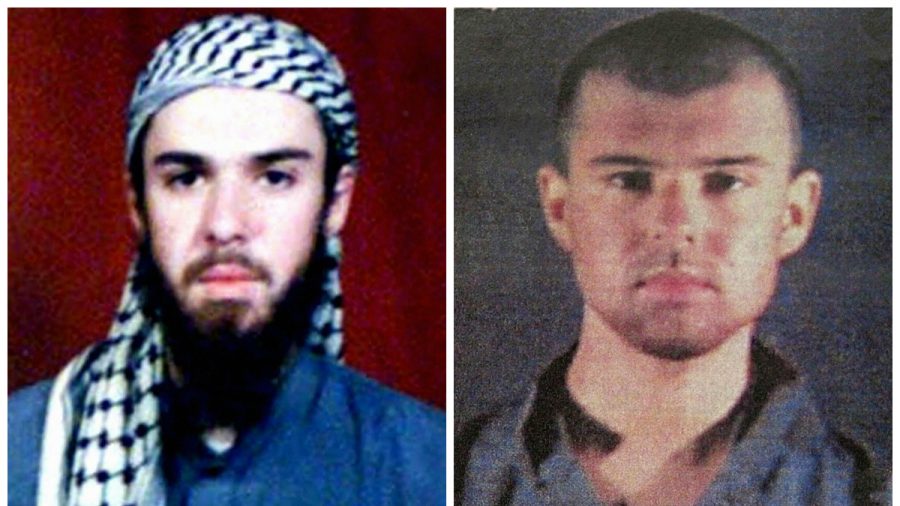John Walker Lindh, the ‘American Taliban’ who pleaded guilty in 2002 for serving as a soldier of the Taliban and was sentenced to 20 years in prison was set free on May 23 after serving 17.5 years in prison.
Lindh, who surrendered to the U.S. troops on Dec. 1, 2001, went down in history as Detainee #001 in the Global War On Terror.
Curiously, the fate of the first detainee in the War On Terror was linked to that of the first American deadly victim in Afghanistan in the war, Johnny ‘Mike’ Spann, an ex-marine, who was dispatched as a CIA spearhead agent to North Afghanistan.
Alison Spann, Johnny’s 37-year-old daughter posted a letter she wrote to President Donald Trump to Twitter on May 31, pleading for the president not to set Lindh free prematurely.
“My dad wasn’t the only one in that prison that day—there was another American [sic] who didn’t warn his fellow countryman of the uprising that was to come. An American who sat back while his fellow countryman was brutally murdered. [sic] An American named John Walker Lindh.”
I wrote this letter to @POTUS asking that the early release of John Walker Lindh be stopped. He’s going to be released on May 23, despite reports that he has continued to “advocate for global jihad.” This is not a reformed prisoner… pic.twitter.com/HVOryefVIE
— Alison Spann (@newsgirlalison) May 21, 2019
So what happened on that fateful day of Nov. 23, 2011, and how did these two American men end up in the desolated environment of North Afghanistan?
Lindh grew up in the wealthy suburbs of San Francisco and converted to Islam at 16. He traveled to Afghanistan in early 2001, and enlisted to the Taliban army because he saw it as his holy duty to protect Muslims who were under attack by a military group known for their ruthlessness and terror—the Northern Alliance.
In early September 2001, Lindh was stationed in the Northeastern province of Takhar. By that time, the Taliban was still an ally of the United States, and, during the 90s, highly esteemed by the US government for its efforts of kicking out the Soviets of Afghanistan.
But this all changed after 9/11 when the U.S. government blamed Al Qaeda and Osama Bin Laden for the attacks and accused the Taliban of hosting and protecting Bin Laden. And so, favor shifted towards the former enemies of the United States, the Northern Alliance.
On Nov. 2001, Lindh was among the 400 Taliban soldiers that surrendered to General Dostum of the Northern Alliance. The soldiers were diverted to the ancient Qala-i-Jangi fortress on the outskirts of Mazar-i-Sharif.
And this is where Mike Spann and his fellow CIA officer David Tyson questioned Lindh, although it’s unclear if Lindh responded with anything at all.
Just a few hours later, a grenade exploded. Luke Harding, a journalist for The Guardian, described what happened next.
“It was then… that Spann ‘did a Rambo.’ As the remaining guards ran away, Spann flung himself to the ground and began raking the courtyard and its prisoners with automatic fire. Five or six prisoners jumped on him, and he disappeared beneath a heap of bodies.”
Mike Spann was killed in the melee. Lindh ran for his life and was shot in the leg. The surviving prisoners were herded together into the basement of a school building and were for the seven days subjected to bombing, incineration, and flooding. Lindh was one of 86 who survived the ordeal before he was “released” by the Red Cross and surrendered to the U.S. forces.
Lind was transferred to an army hospital where he was interviewed by Robert Young Pelton on NBC.
Spann’s body was retrieved and buried during a state funeral at Arlington Cemetery near Washington, bestowed with the highest military honors.
Meanwhile, U.S. authorities sometimes had Lindh blindfolded, naked, and bound to a stretcher with duct tape on which he was exposed to extreme cold and drought. A bullet was removed from his femur after two weeks in U.S. custody. After one month in U.S. custody, he first got to talk to his lawyer.

In an op-ed article to The Guardian, on June 23, 2017, Frank Lindh, father of John Walker Lindh, wrote that during his over 25-year career as a lawyer, he had never “seen or read about a case in which a person accused of a crime was so conspicuously deprived of what we call ‘the presumption of innocence.'”
The government’s case eventually dropped nine of the ten counts, including charges he tried to kill a CIA officer and support terrorism. Lindh ultimately pleaded guilty to violating an executive order prohibiting aid to a blacklisted organization and for carrying weapons in Afghanistan.
At his sentencing, Lindh, then 21, said, “I condemn terrorism on every level—unequivocally.”
Lindh has now attained Irish citizenship and hopes to start a new life in Ireland as a free man.


